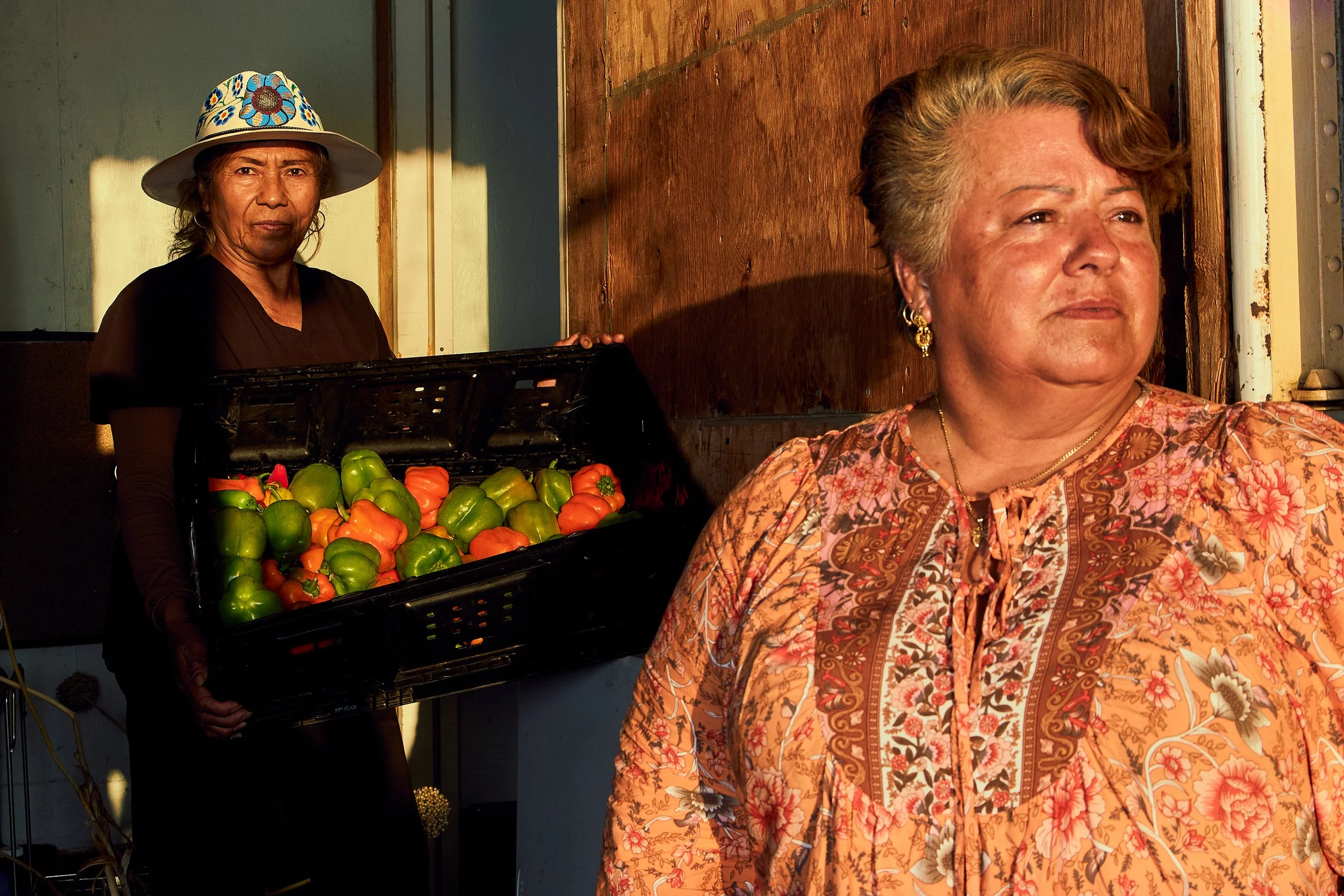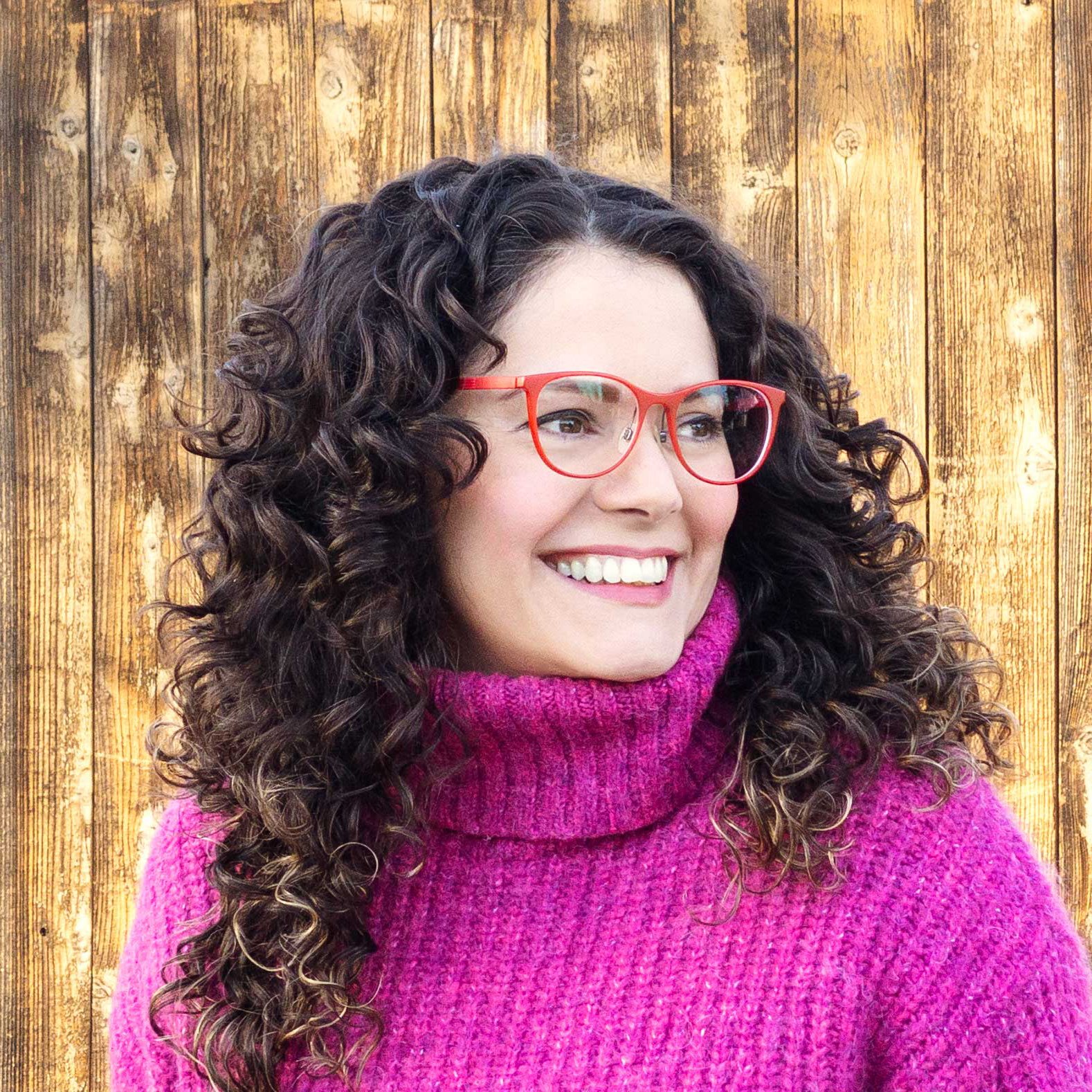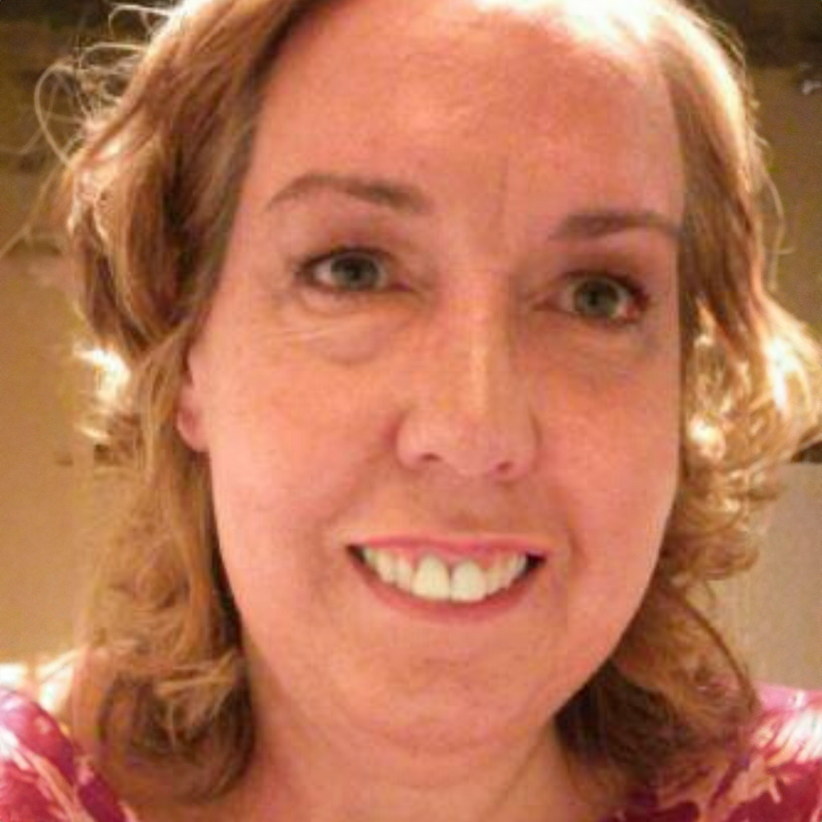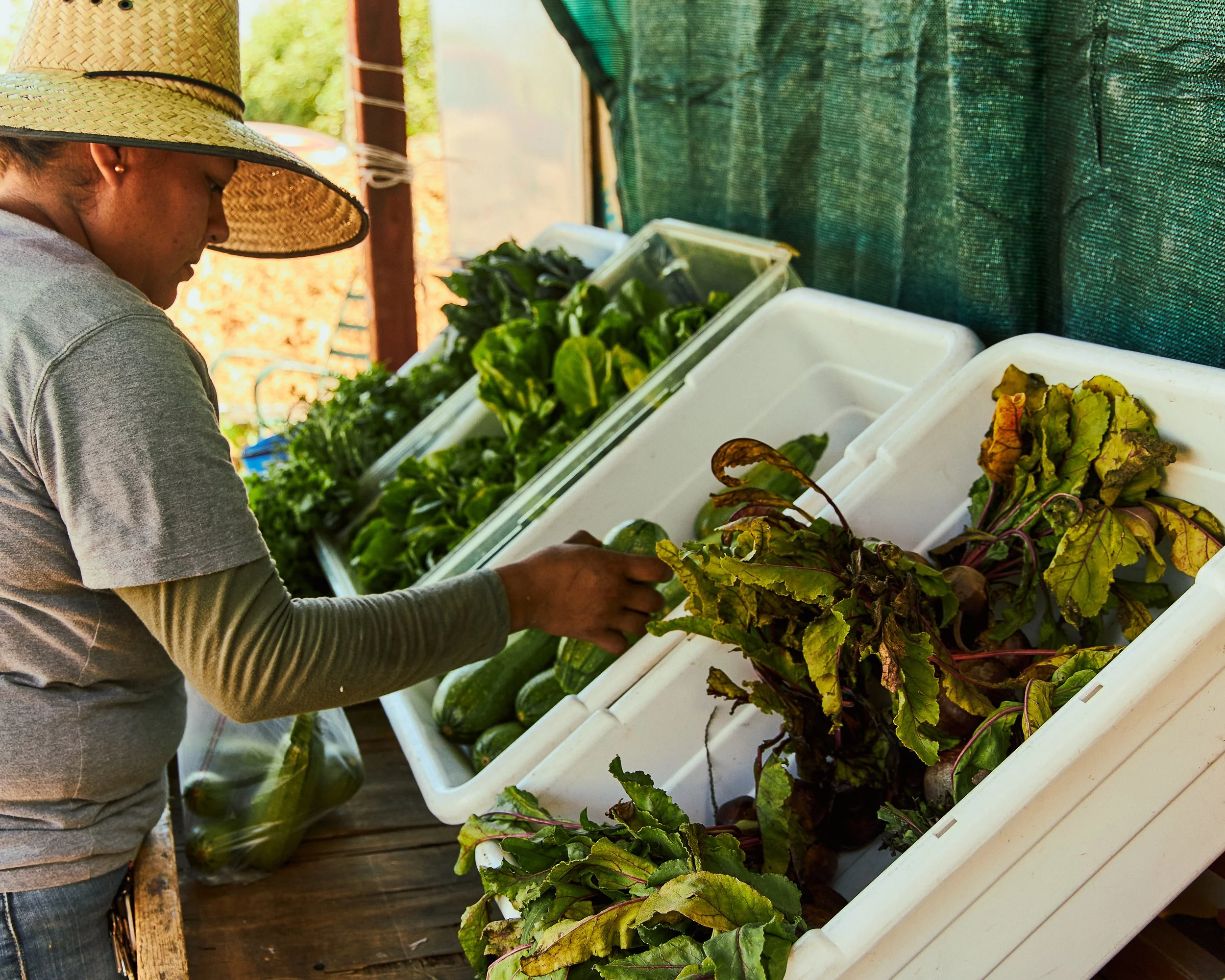Harvesting Hope: Feeding Bodies and Spirits
Maricela Contreras (left) and María Alonso at Huerta del Valle, a community garden in Ontario, Calif. Alonso founded the garden to provide affordable organic food for her family and community. Contreras has grown vegetables there since 2013. Photo by Eileen Solorzano for palabra
In a California food desert, one garden cultivates community — and change.
When you set foot in Huerta del Valle, the beauty of the place strikes you. To the left, tomatillos, corn, and peanuts flourish; to the right, tall sunflowers sway in the breeze. Along the path, lush trees offer shade, inviting visitors to slow down, sit beneath the branches, and enjoy a peaceful moment with nature.
This nonprofit community garden provides a space where Latino families in Ontario, California, can access fresh, affordable, organic produce. What started as one mother’s search for healthier options has grown into a lively center for growing, sharing, and selling vegetables and fruits within a supportive local network.
It's the brainchild of María Alonso, whose journey toward organic food began in June 2010, the day her son was diagnosed with ADHD. The doctors immediately recommended medication. But she hesitated. “Why should my 10-year-old take pills when I, in my fifties, take none?” she asked.
The doctor’s response struck a chord: He pointed to the difference in how they were raised. She grew up in rural Mexico, in a family of farmers and ranchers. Her parents raised chickens and pigs on table scraps, free from pesticides, hormones, and processed feeds. “That’s the difference,” she recalled the doctor saying.
María Alonso started Huerta del Valle to provide organic food for her family and improve community health. The garden has become a vital resource for Latino residents in Ontario, Calif. Photo by Eileen Solorzano for palabra
Determined to give her son a better path, she sought out organic food, but found it scarce and painfully expensive, almost a luxury for low-income families. Still, she persisted. Her husband backed her resolve, telling her, “Give our son the organic food — I'll take on more jobs so we can afford it.”
In 2011, while serving as a Spanish-speaking advocate at local schools, she met a student who was completing her thesis on community gardens and urban agriculture. The student encouraged her to start a project of her own. She said yes and started her first garden beds in a small piece of land on school grounds. By 2012, the city had received a $1 million grant from Kaiser Permanente to promote healthy eating and active living. Recognizing the potential of her growing project, they invited her to be a community partner. The city offered her five acres of land, and she eagerly accepted the opportunity.
“There’s a lot of food at the food banks — anywhere you go, they give you loads of food. But it’s canned, grown with pesticides and herbicides, and much of it is even expired,” Alonso said in Spanish. “So if we focus on having a garden every mile, we could […] be getting high-quality food, and we could have a city that’s more positive, more open, because, in the end, we are what we eat. If we eat processed food, it affects us.”
By 2013, she and a group of community members had officially begun working the land, expanding from just two small beds — where she planted broccoli, cauliflower, and cucumbers according to the season — into a full-fledged community garden.
Seasonal produce is sorted into crates for community members to purchase at affordable prices. Photo by Eileen Solorzano for palabra
“The challenges were many — being a woman, being Latina, not speaking the language, not having access to technology, and being older — at that time, I was 53 years old,” said Alonso. “Someone else in my shoes might not have taken the leap the way I did, having been undocumented all this time. Just two months ago, I received my work permit. [To have made it this far] has been a great honor.”
Seventy percent of Latinos living in California’s Inland region say it’s difficult to access healthy food at an affordable price, according to a 2024 survey conducted by the CIELO Fund in partnership with the Possibility Lab at the Goldman School of Public Policy and the Berkeley Institute of Governmental Studies at the University of California.
The organization offers the public the opportunity to rent a small plot of land in the community area, where they can grow their produce. The annual rent cost is $60, which includes access to water, seeds (if available), expert advice from Huerta’s team, and one or two workshops per month on topics such as irrigation systems or plant diseases, tailored to the community's specific needs.
A member of the community garden tends to his crop. Photo by Eileen Solorzano for palabra
In this program, participants grow more than just food. They build confidence, agency, and a sense of belonging.
This is the case for Maricela Contreras, who has been part of the garden since 2013, and rents a plot where she cultivates spearmint, artichokes, and plump heirloom tomatoes.
“My motivation is to eat healthy on a low budget and to stay active, both physically and mentally, because being in contact with the earth is energizing,” Contreras said in Spanish. “This is a blessing. Right now, the times we’re living through are stressful, and this place is a wonderful space to let go of all those things we’re holding inside.”
Maricela Contreras with the season's harvest from her plot at Huerta del Valle. Photo by Eileen Solorzano for palabra
For Alonso, Huerta del Valle isn’t just a garden — it’s a refuge. One story she carries especially close to her heart is that of a little boy with special needs, Jimmy, who came to the garden with his mother between 2018 and 2022. She remembers how timid he was when he first arrived, clinging tightly to his mother and scared of nearly everything. But over time, Alonso saw a remarkable change in him.
Slowly, Jimmy began to feel more at ease. He began exploring the garden, playing with insects, and even teaching other children about what he had discovered. To Alonso, it was clear that the garden had become a place where he truly felt at home.
His progress was so profound that he eventually transitioned to a regular classroom — a milestone that filled Alonso with pride. In 2022, Jimmy and his family moved to Las Vegas in search of better opportunities, but Alonso is sure of one thing: “I know in his heart, Huerta del Valle will always be with him,” she told palabra.
María Alonso shares ackee fruit with a customer at Huerta del Valle. Photo by Eileen Solorzano for palabra
Growing Justice, One Box at a Time
The nonprofit offers a Community Supported Agriculture (CSA) harvest box program featuring seasonal, organic produce. Boxes range in price from $28 to $45 and are available for either pickup or delivery. On Mondays, the organization distributes free produce to individuals and families experiencing financial hardship.
“Organic vegetables are expensive — very expensive — Huerta does this [work] so that everyone can come and take home their vegetables at low prices,” said Andrés Vicario, who is in charge of the production at the non-profit.
Support the voices of independent journalists.
|
Another program that Alonso is proud to support at Huerta del Valle is the “Círculos de Sanación” or Healing Circles, which welcome around 25 to 29 participants and focus on nurturing physical, mental, and spiritual well-being.
Participants gather under a canopy while soothing music plays. In the center, a sound bath practitioner guides them through deep meditation and visualization exercises. Alonso describes how the sessions often invite people to imagine peaceful places — or confront fears, such as being stopped by immigration officials — and then help them breathe through the experience, allowing them to find a sense of calm.
After the session, participants have the opportunity to share their thoughts and experiences. For Alonso, making space for this kind of healing work is essential. “It’s about cultivating community, creating family, and empowering people,” she said.
Maricela Contreras makes tortillas for visitors at Huerta del Valle. The garden has become a social hub, cultivating community alongside food. Photo by Eileen Solorzano for palabra
Lupita, a gardener and worker at Huerta del Valle, selects zucchini from harvest crates. Photo by Eileen Solorzano for palabra
In times of federal funding cuts
Amid these challenging times, when federal funds are being cut, affecting programs and organizations nationwide, Alonso recognizes that the lack of funding could impact Huerta del Valle in numerous ways, restricting the programs offered and the support provided. Still, she refuses to let that be the end of the story. “I’ve always said that real change doesn’t come from the government; it starts with us,” she explains.
Instead of waiting to secure resources, she focuses on collective growth, encouraging others to step up and share their knowledge and expertise. Finding people with the passion and commitment to give back isn’t always easy, she admits, but it’s not impossible. For Alonso, the key lies in believing that the answers already exist within the community.
Maricela Contreras (left) and María Alonso at Huerta del Valle in Ontario, Calif. The garden provides organic produce and strengthens community ties. Photo by Eileen Solorzano for palabra
—
Roxsy Lin is a bilingual journalist and illustrator from Venezuela. Her work explores the vibrant rhythms of Latinidad, with a focus on arts, culture, and communities, amplifying the diverse voices shaping the modern Latinx landscape. @roxsy_lin
Eileen Solorzano is a Salvadoran-Guatemalan American photographer and graphic designer whose work blends cultural heritage, human connection, and contemporary aesthetics. Guided by her Montessori education and a multidisciplinary approach, she integrates graphic design, philosophy, and fashion to craft visuals that explore identity, emotions, and the interplay of light and space. In addition, Eileen has obtained a dual Bachelor of Arts degrees in Photography and Graphic Design, with a Minor in Philosophy, at California Baptist University. @estudiosolorzano.co
Patricia Guadalupe, raised in Puerto Rico, is a bilingual multimedia journalist based in Washington, D.C., and is the co-managing editor of palabra. She has been covering the capital for both English- and Spanish-language media outlets since the mid-1990s and previously worked as a reporter in New York City. She’s been an editor at Hispanic Link News Service, a reporter at WTOP Radio (CBS Washington affiliate), a contributing reporter for CBS Radio network, and has written for NBC News.com and Latino Magazine, among others. She is a graduate of Michigan State University and has a Master’s degree from the Graduate School of Political Management at George Washington University. She is the former president of the Washington, D.C., chapter of NAHJ and is an adjunct professor at American University in the nation’s capital and the Washington semester program of Florida International University. @PatriciagDC















